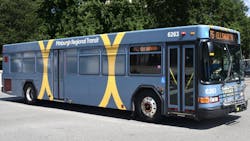PRT releases final summary of public feedback regarding proposed service reductions
Pittsburgh Regional Transit (PRT) has released the final summary of public feedback received during its public comment period regarding proposed service reductions and fare increases that are being considered because of a significant budget shortfall.
The report documents the voices of more than 4,800 individuals who submitted testimony during a nearly three-month process between March 31 and June 18 through in-person hearings, online submissions, voicemail, mail and printed forms. PRT says that unsurprisingly, individuals overwhelmingly opposed the cuts and fare increases.
According to the agency, at the core of the proposal is a projected $100 million operating budget deficit for fiscal year 2026 caused by stagnant state funding, rising inflation and long-term ridership declines following the COVID-19 pandemic. Without new revenue, PRT has proposed deep service cuts and fare increases to remain financially solvent.
The proposed changes include:
- A 35 percent reduction in bus, light rail and incline service, beginning as early as February 2026.
- Elimination of 41 bus routes and the Silver Line light-rail service.
- Reduced frequency on dozens of other routes, with no transit service after 11:00 p.m.
- A 25-cent increase to the base fare, raising it to $3 – one of the highest in the country.
- A 62 percent reduction in the ACCESS paratransit ADA-protected service area and an average 20 percent increase in ACCESS fares.
- Closure of two PRT bus garages, the Wabash Tunnel and 10 park-and-ride lots.
- Elimination of extra service, including before and after concerts, and the 2026 NFL Draft.
“This proposal reflects a worst-case scenario,” said PRT CEO Katharine Kelleman. “If we don’t receive new funding, these service cuts and fare hikes are the only path forward. We’ve done everything we can internally – cutting costs, increasing non-fare revenue and building a more efficient system – but the funding gap has grown too large to close on our own.”
Key takeaways from the public comment period
- 99 percent of commenters opposed all or specific service reductions, emphasizing disproportionate harm to transit-dependent communities.
- 60 percent of commenters opposed the fare increase while many who supported it did so reluctantly, hoping it would prevent deeper cuts.
- 98 percent opposed cuts to ACCESS service, expressing concern for seniors and people with disabilities who rely on door-to-door transit.
PRT says that in analyzing the feedback, it found consistent themes around access to work, healthcare, grocery stores and childcare, as well as fear of isolation for people with disabilities, older adults and low-income riders. The agency notes public comments also highlighted how cuts to transit service could ripple through the region’s economy, hurting employers who depend on service workers, increasing congestion and reducing air quality.
The agency notes it has also emphasized that these cuts would cancel or delay other planned improvements, including the Bus Line Redesign project, which would improve job access and service reliability for hundreds of thousands of residents without additional costs to the agency.
“This isn’t just a transit issue. It’s an economic issue, a health issue and a fairness issue,” Kelleman said. “People across Allegheny County depend on public transit, whether they ride it or not. We need our state leaders to act before this crisis becomes irreversible.”
PRT says it continues to advocate for a long-term, dedicated and growing funding solution. The agency supports Pennsylvania Gov. Josh Shapiro’s proposal to increase the transit share of the state sales tax, but notes that even this would only partially close the funding gap.
